Upon our arrival at the Cadillac Motel on Saturday, July 27th, we were greeted by a heartwarming sight. Several people, including some of our dedicated volunteers, were already standing in line at the corner of Second and Frayser Street, eagerly waiting for us to set up the tables and unload all the totes we had loaded on the trailer the previous day.
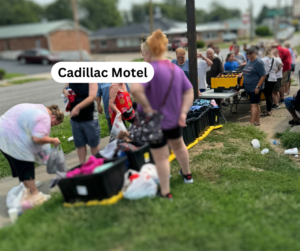 One volunteer, Riley, who isn’t even ten years old, was there again. If you haven’t already, you should read the journal I wrote about our outreach on April 27th and this boy. It is profound. His empathy and compassion are lightyears beyond adults in their fifties who profess to be at the pinnacle of their Christian walk. He accompanied me around the property, knocking on doors and delivering food bags to those with mobility issues who could not reach the tables. As we walked around the rooms, he told me he wanted to come down to the Cadillac and help people when he got older. You’ll probably remember things you said as a child that you thought you would be doing when you grew up that never actually happened. Maybe he will; perhaps he won’t. But with that heart, he’s going to do something unique. He was disappointed that some of the residents we had given to before, including the man in the wheelchair and the one-room over capacity with children, were gone. I explained to him that this was the nature of the beast. Residents pay their $250 per week, and if they don’t have the money (due to whatever unfortunate choice may have been made or unavoidable bad circumstances that arise), they’re out on the street.
One volunteer, Riley, who isn’t even ten years old, was there again. If you haven’t already, you should read the journal I wrote about our outreach on April 27th and this boy. It is profound. His empathy and compassion are lightyears beyond adults in their fifties who profess to be at the pinnacle of their Christian walk. He accompanied me around the property, knocking on doors and delivering food bags to those with mobility issues who could not reach the tables. As we walked around the rooms, he told me he wanted to come down to the Cadillac and help people when he got older. You’ll probably remember things you said as a child that you thought you would be doing when you grew up that never actually happened. Maybe he will; perhaps he won’t. But with that heart, he’s going to do something unique. He was disappointed that some of the residents we had given to before, including the man in the wheelchair and the one-room over capacity with children, were gone. I explained to him that this was the nature of the beast. Residents pay their $250 per week, and if they don’t have the money (due to whatever unfortunate choice may have been made or unavoidable bad circumstances that arise), they’re out on the street.
Thanks to your support, we were able to distribute about one hundred food bags and essential hygiene items such as toilet paper and feminine hygiene products at this stop. A generous donation of a large box filled with chocolate and other sweet candies added a special touch to the distribution. Your specific contributions, whether the food bags, hygiene items, or sweet candies, made this possible, and we couldn’t be more grateful for your integral role in our mission. Your support has not only made a difference in the lives of those we serve but has also brought hope and comfort to our community.
After the crowd had dispersed, we loaded up and headed for Tent City, off (*retracted). My wife, Kimberly, had exchanged cell phone numbers with one of the female residents when we were there last month and had been advised that we were headed their way. So, upon arrival, the residents were already walking down the railroad tracks toward the area where we always set up. (Yes, some people experiencing homelessness have jobs, and they earn money to purchase things they need, such as time on their phones.)
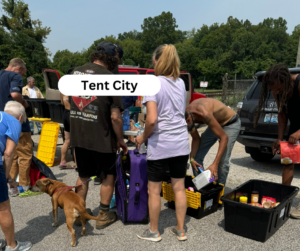 During that communication, we were advised that they needed some specific items that I would have never thought of but made a lot of sense, such as nails, batteries, and duct tape, which we were happy to provide. When the individual who requested these items was given them, she quickly dispersed them amongst the others living there. It was just another reminder of the sense of community amongst those experiencing homelessness that you seldom see elsewhere on our stops. In fact, the same long-term resident made a profound statement for the first time since we’ve been visiting Tent City. She did not realize until then that we had been setting aside specific totes with special items intended strictly for them, and, in the past, she had restrained herself from taking too much from the totes because she thought the items inside were also intended for other people on our different stops. I find this behavior to be in strong contrast to the stigma that people who are experiencing homelessness are just out to get everything they can, as compared to some who are not experiencing homelessness, grabbing everything with little regard for their neighbor’s needs. I’ve said it once; I’ll repeat it. Those people who are experiencing homelessness are amongst the most humble and polite we run across. Yet they’re widely regarded as dirty, violent scam artists, probably with a criminal record, who “deserve” to be homeless.
During that communication, we were advised that they needed some specific items that I would have never thought of but made a lot of sense, such as nails, batteries, and duct tape, which we were happy to provide. When the individual who requested these items was given them, she quickly dispersed them amongst the others living there. It was just another reminder of the sense of community amongst those experiencing homelessness that you seldom see elsewhere on our stops. In fact, the same long-term resident made a profound statement for the first time since we’ve been visiting Tent City. She did not realize until then that we had been setting aside specific totes with special items intended strictly for them, and, in the past, she had restrained herself from taking too much from the totes because she thought the items inside were also intended for other people on our different stops. I find this behavior to be in strong contrast to the stigma that people who are experiencing homelessness are just out to get everything they can, as compared to some who are not experiencing homelessness, grabbing everything with little regard for their neighbor’s needs. I’ve said it once; I’ll repeat it. Those people who are experiencing homelessness are amongst the most humble and polite we run across. Yet they’re widely regarded as dirty, violent scam artists, probably with a criminal record, who “deserve” to be homeless.
And to be honest with you, I was one of those people who thought that way about the person begging on the corner, living in less than hospitable areas of town or on the streets. I wouldn’t have stepped onto any of these properties ten years ago. Even today, when I pull up to a corner and see someone standing there with a sign, I mostly try to act like I don’t see them since I know I don’t have any cash. And I am not proud of that. I ought to carry food bags and bottled water for such occasions.
Are some people experiencing homelessness going through challenges that the rest of us deem are messed up? Like an unhealthy addiction or criminal record? You bet. And yourself? Are we not all broken in some way?
When we have enough food to go around, we try to give each resident at Tent City enough food bags for each person to have one per day until we return. While this hardly meets their nutritional needs, each bag will have a protein, such as a tuna pack or can of Vienna sausages. Then, a pack of peanut butter crackers, oatmeal, Ramen noodles, a cereal bar, a fruit cup, apple sauce, and a treat, such as a Little Debbie snack. When available, we also give the residents at Tent City essential hygiene items, including wipes, used shoes, socks, and totes to help keep their belongings dry and away from rodents and insects. And then plenty of drinking water. Also, odds and ends, such as a purple suitcase that someone donated. That was quickly abducted by one of the residents and used for transport provisioning. We’ve had tattered firefighters’ suits and a duck blind donated that were more desired than I would’ve thought.
Before departure, Pastor Nick Martin from Redemption Place Church, who had chosen to accompany us on this day, prayed with us all. Nick has also accompanied us on several outreach events. Finding a pastor out in the wild is about as rare as a unicorn, so we’re always honored to have him.
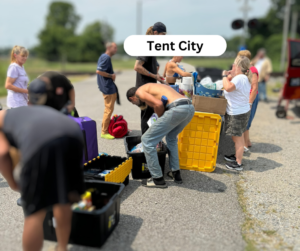 We loaded up and headed to our next stop, the Colonel House Motel. Upon our arrival, it was evident that something had changed. Hardly no one was there. On each of our visits over the past few months, I noticed that more doors were being barricaded shut to rooms that had been destroyed and not repaired. An entire wing had been shut down, and only about fifteen people lived on the entire property. We sat at one table and handed out enough food for everyone, and after knocking on each door, we decided to move on to our next stop. I would say that this is the beginning of the end for the Colonel House Motel, but it’s been here for years. So, we will see what happens. Should this cease being one of our stops, it’s unclear if we will pick another stop to replace it. With the weaning interest from the general public to help, it’s unlikely.
We loaded up and headed to our next stop, the Colonel House Motel. Upon our arrival, it was evident that something had changed. Hardly no one was there. On each of our visits over the past few months, I noticed that more doors were being barricaded shut to rooms that had been destroyed and not repaired. An entire wing had been shut down, and only about fifteen people lived on the entire property. We sat at one table and handed out enough food for everyone, and after knocking on each door, we decided to move on to our next stop. I would say that this is the beginning of the end for the Colonel House Motel, but it’s been here for years. So, we will see what happens. Should this cease being one of our stops, it’s unclear if we will pick another stop to replace it. With the weaning interest from the general public to help, it’s unlikely.
Our last stop is Dixiana Court, where many Burmese live. Thankfully, there’s not a lot of turnover here, and most residents recognize us now, which is helpful given the language barrier. Nevertheless, when knocking on doors, I will inadvertently meet someone who doesn’t understand why I’m there until I give them the universal sign for eating and then a gesture to where we’re set up. I’ll give you a couple of examples of my encounters. After hitting all of the doors, I walked back to where we were set up, and I noticed a young man sitting on a park bench, isolated from the others. With his scowled expression, it didn’t appear that he wanted to be bothered, and my wife warned me not to approach him. But something told me that I needed to, so I did. He didn’t speak English but understood from my gesturing that we had food. He followed me to the tables and reluctantly took the items I had put into his hands. You could tell by the change in his demeanor that he was very thankful and bewildered by the experience. In contrast to that, another young man abruptly pulled his vehicle onto the sidewalk, blocking the path I was walking on, and, speaking perfect English, wanted to know “why the hell” I was aggressively knocking on his girlfriend’s door—a different response than the man on the park bench. Being an older man in an arm sling, I probably did not seem that threatening; I gently explained what we were doing, and the situation quickly de-escalated. According to this young man, a church delivered meals to the residents each weekday. This is the first time we have heard of this.
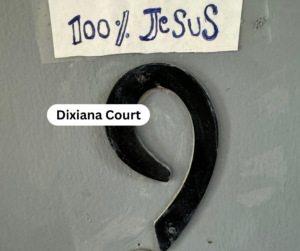 We quickly handed out another 150 bags of food. Because these apartments have kitchens, we reserved food suitable for preparation on a stove or in an oven for this stop: mac and cheese, lentils, rice, dry beans, canned food, and other nonperishables.
We quickly handed out another 150 bags of food. Because these apartments have kitchens, we reserved food suitable for preparation on a stove or in an oven for this stop: mac and cheese, lentils, rice, dry beans, canned food, and other nonperishables.
By now, there were just four of us. My wife and I, two volunteers from Ridgewood Baptist, have consistently helped us with each outreach since the first of the year. We loaded up what little remained and transported everything back to our store, where we unloaded and called it a day.
I have to say that this outreach event was by far our most organized and smoothest one yet. But I must remind myself that this is a rare exception. By default, it’s a disorganized mess, no matter how much effort you try to plan otherwise. It will never happen if you wait to do it until it’s perfect. It’s just the nature of the beast.
In closing, I would like to mention that a longer-term resident at Tent City, for our purposes here, we will call “Doppler” (those that know get the wordplay there) who was missing this past time that we were there. After inquiring about him, we were told he had moved away to an undisclosed location “on another beach.” This man has been with the group for years, and we regarded him as the group’s leader as he often distributed goods, settled disputes, and behaved as the spokesperson. I believe we met him when Tent City was located at the boat ramp at English Park before the City of Owensboro destroyed their habitat to discourage them from living there. And I may know why he left.
According to the Lexington Harold Leader, “The Kentucky law’s most controversial section created a new offense, “unlawful camping,” which can result in arrest and fines for people who are trying to sleep in specified public and private spaces that are not designated for camping, including on sidewalks or roadsides, under bridges, or in parks, parking lots, garages or doorways.” It’s my understanding this took effect on July 15th.
“The 78-page bill criminalizes homelessness—and decriminalizes the use of deadly force against individuals engaging in “unlawful camping.” Under this law, if a property owner believes an unhoused trespasser is attempting to commit a felony or attempting to “dispossess” them, they can shoot the homeless person,” writes The Nation. Hopefully, that last statement exemplifies the media over-sensationalizing to attract attention.
If I had been Doppler, upon receiving this news, I would have decided to separate myself from the group, seek out an isolated place to camp far away, and remain out of sight. This isn’t very encouraging because survival could be a lot easier in a community of like-minded individuals. But if they’re going to be hunted down by law enforcement, it would be better not to be around when they show up with their handcuffs and the city with their bulldozers. Law enforcement officers and employees of the City of Owensboro are doing what their employers tell them to do, and we all ought to be careful where we target our concerns about those experiencing homelessness. I can’t see (the city or law enforcement) being interested in this community of people living so far out of public sight.
All of the real names used here were with permission. Otherwise, the names have been changed. To protect the identity of those photographed, they have been blurred intentionally unless consent was given before publishing. Riley’s parents permitted us to publish his name and picture.
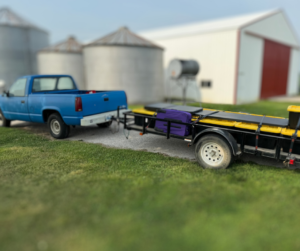 Lastly, not that anyone would be keeping track of this, but the truck we call Ole’ Blue that we use for our outreach events has been repaired and is back in service. We had considered junking the car after its wheel fell off the previous month, but we couldn’t part with it.
Lastly, not that anyone would be keeping track of this, but the truck we call Ole’ Blue that we use for our outreach events has been repaired and is back in service. We had considered junking the car after its wheel fell off the previous month, but we couldn’t part with it.
Read more at: https://www.kentucky.com/news/politics-government/article289608176.html#storylink=cpy
https://www.thenation.com/article/society/kentucky-crime-bill/
*Tent City’s location has been removed. The Safer Kentucky Act, which went into effect on July 15, 2024, makes sleeping or camping in public areas illegal, including on sidewalks, roadsides, under bridges, or in parks, parking lots, garages, or doorways. The law creates a new offense called “unlawful camping” that can result in arrest and fines. Assisting those individuals is considered to be aiding and abetting, which is a legal doctrine that refers to the act of helping or encouraging someone to commit a crime. The person who aids and abets is generally held to the same degree of criminal liability as the person who commits the crime. We ask that you please not attempt to locate or visit Tent City.
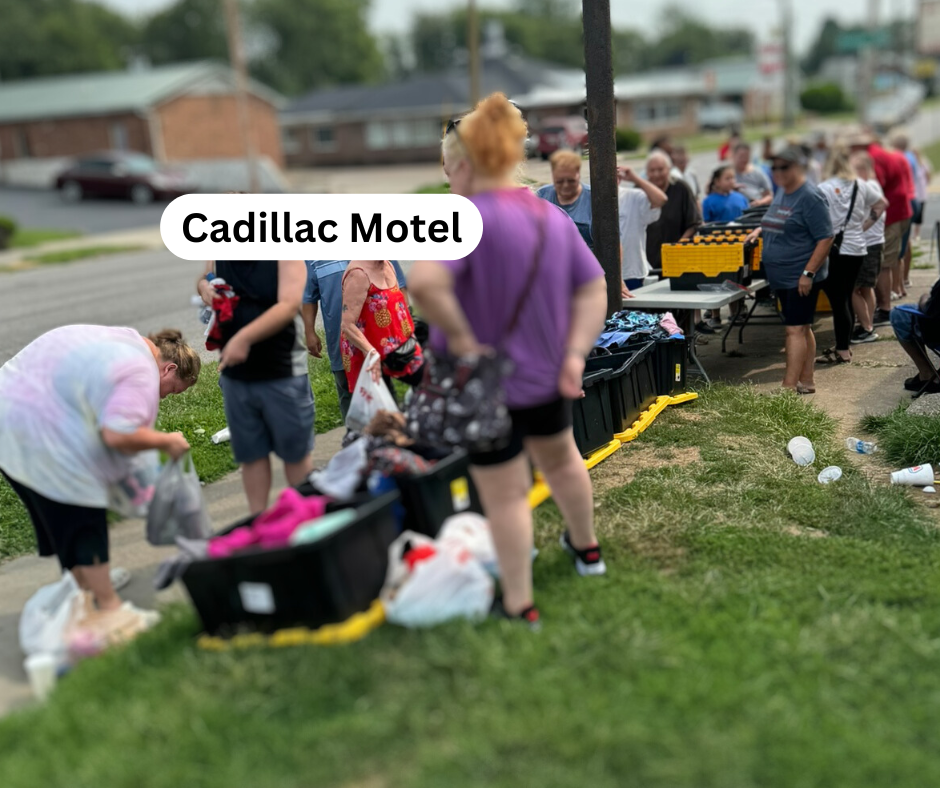
 One volunteer, Riley, who isn’t even ten years old, was there again. If you haven’t already, you should read the journal I wrote about our
One volunteer, Riley, who isn’t even ten years old, was there again. If you haven’t already, you should read the journal I wrote about our  During that communication, we were advised that they needed some specific items that I would have never thought of but made a lot of sense, such as nails, batteries, and duct tape, which we were happy to provide. When the individual who requested these items was given them, she quickly dispersed them amongst the others living there. It was just another reminder of the sense of community amongst those experiencing homelessness that you seldom see elsewhere on our stops. In fact, the same long-term resident made a profound statement for the first time since we’ve been visiting Tent City. She did not realize until then that we had been setting aside specific totes with special items intended strictly for them, and, in the past, she had restrained herself from taking too much from the totes because she thought the items inside were also intended for other people on our different stops. I find this behavior to be in strong contrast to the stigma that people who are experiencing homelessness are just out to get everything they can, as compared to some who are not experiencing homelessness, grabbing everything with little regard for their neighbor’s needs. I’ve said it once; I’ll repeat it. Those people who are experiencing homelessness are amongst the most humble and polite we run across. Yet they’re widely regarded as dirty, violent scam artists, probably with a criminal record, who “deserve” to be homeless.
During that communication, we were advised that they needed some specific items that I would have never thought of but made a lot of sense, such as nails, batteries, and duct tape, which we were happy to provide. When the individual who requested these items was given them, she quickly dispersed them amongst the others living there. It was just another reminder of the sense of community amongst those experiencing homelessness that you seldom see elsewhere on our stops. In fact, the same long-term resident made a profound statement for the first time since we’ve been visiting Tent City. She did not realize until then that we had been setting aside specific totes with special items intended strictly for them, and, in the past, she had restrained herself from taking too much from the totes because she thought the items inside were also intended for other people on our different stops. I find this behavior to be in strong contrast to the stigma that people who are experiencing homelessness are just out to get everything they can, as compared to some who are not experiencing homelessness, grabbing everything with little regard for their neighbor’s needs. I’ve said it once; I’ll repeat it. Those people who are experiencing homelessness are amongst the most humble and polite we run across. Yet they’re widely regarded as dirty, violent scam artists, probably with a criminal record, who “deserve” to be homeless. We loaded up and headed to our next stop, the Colonel House Motel. Upon our arrival, it was evident that something had changed. Hardly no one was there. On each of our visits over the past few months, I noticed that more doors were being barricaded shut to rooms that had been destroyed and not repaired. An entire wing had been shut down, and only about fifteen people lived on the entire property. We sat at one table and handed out enough food for everyone, and after knocking on each door, we decided to move on to our next stop. I would say that this is the beginning of the end for the Colonel House Motel, but it’s been here for years. So, we will see what happens. Should this cease being one of our stops, it’s unclear if we will pick another stop to replace it. With the weaning interest from the general public to help, it’s unlikely.
We loaded up and headed to our next stop, the Colonel House Motel. Upon our arrival, it was evident that something had changed. Hardly no one was there. On each of our visits over the past few months, I noticed that more doors were being barricaded shut to rooms that had been destroyed and not repaired. An entire wing had been shut down, and only about fifteen people lived on the entire property. We sat at one table and handed out enough food for everyone, and after knocking on each door, we decided to move on to our next stop. I would say that this is the beginning of the end for the Colonel House Motel, but it’s been here for years. So, we will see what happens. Should this cease being one of our stops, it’s unclear if we will pick another stop to replace it. With the weaning interest from the general public to help, it’s unlikely. We quickly handed out another 150 bags of food. Because these apartments have kitchens, we reserved food suitable for preparation on a stove or in an oven for this stop: mac and cheese, lentils, rice, dry beans, canned food, and other nonperishables.
We quickly handed out another 150 bags of food. Because these apartments have kitchens, we reserved food suitable for preparation on a stove or in an oven for this stop: mac and cheese, lentils, rice, dry beans, canned food, and other nonperishables. Lastly, not that anyone would be keeping track of this, but the truck we call Ole’ Blue that we use for our outreach events has been repaired and is back in service. We had considered junking the car after its wheel fell off the previous month, but we couldn’t part with it.
Lastly, not that anyone would be keeping track of this, but the truck we call Ole’ Blue that we use for our outreach events has been repaired and is back in service. We had considered junking the car after its wheel fell off the previous month, but we couldn’t part with it.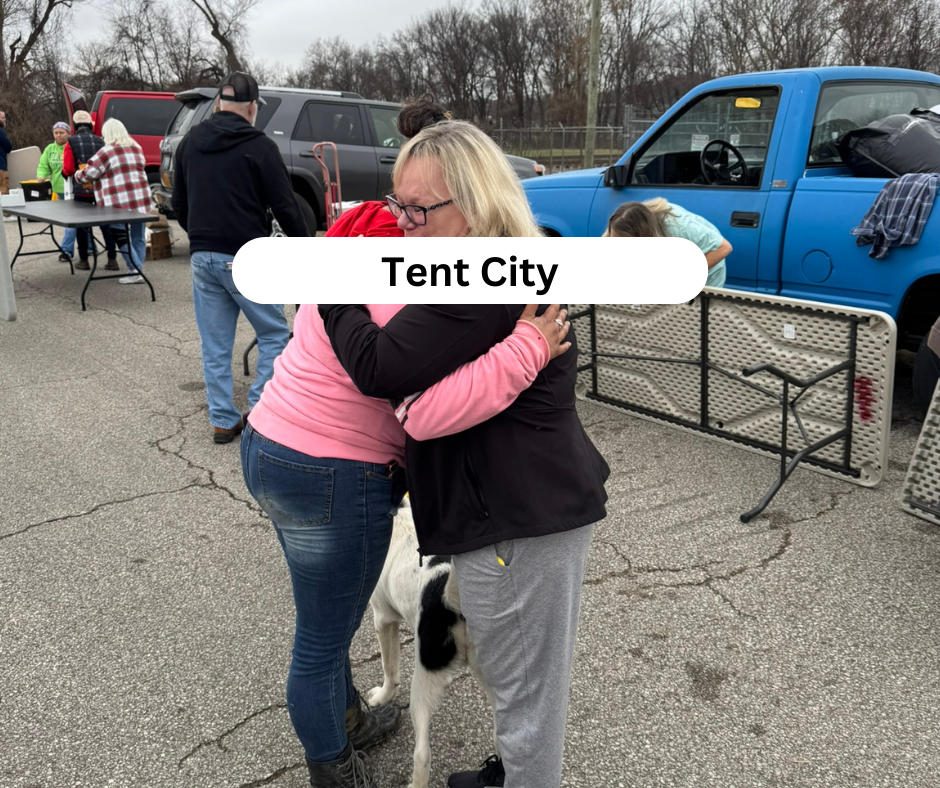
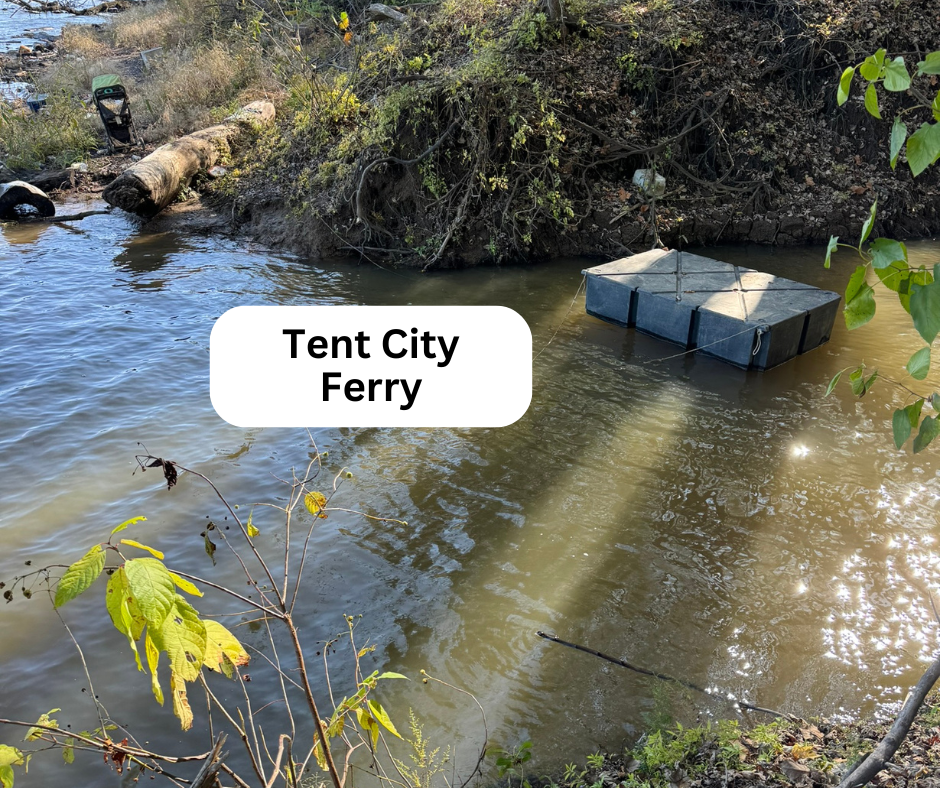
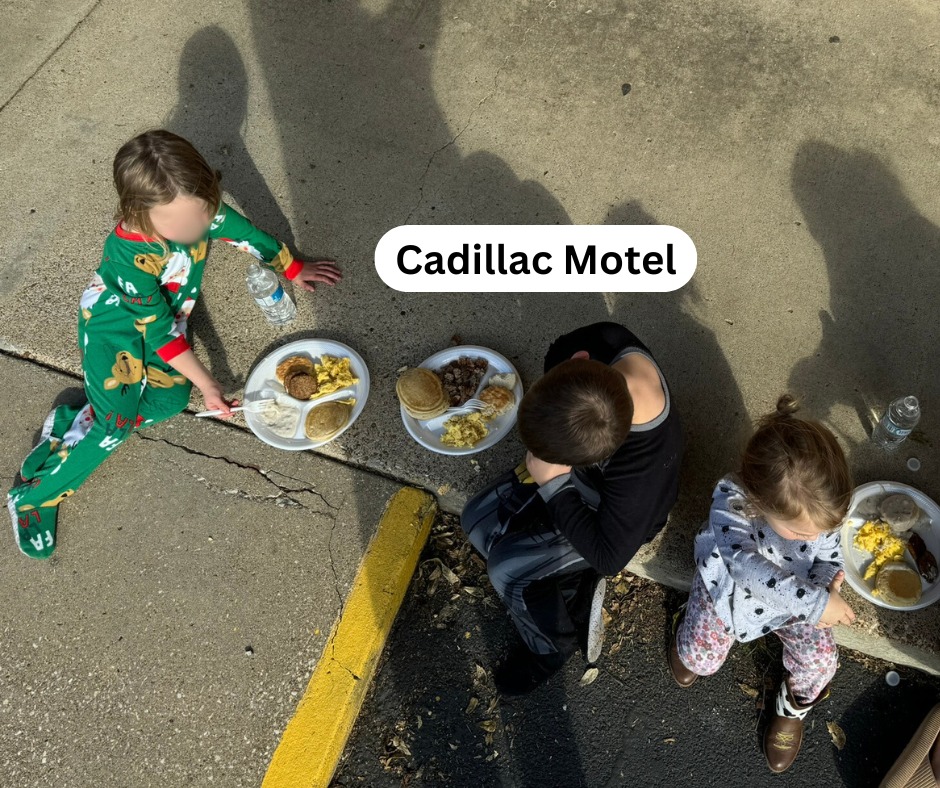
Wow, just wow. People like you restore my faith in humanity. God is using you in mighty ways, I am praying for you and hope that you do not become discouraged, as you are so desperately needed. It is very easy to donate and pay yourself on the back for being a “good Christian” when your peers are watching, it is an entirely different and difficult path you have chosen, but one that I believe truly encompasses what it means to truly do as Jesus did. I will be in touch, I am receiving a small settlement from an accident soon and I would love to be a small help to you, as I have needed help in the past since my accident and want to pay it forward. God bless you and your family!